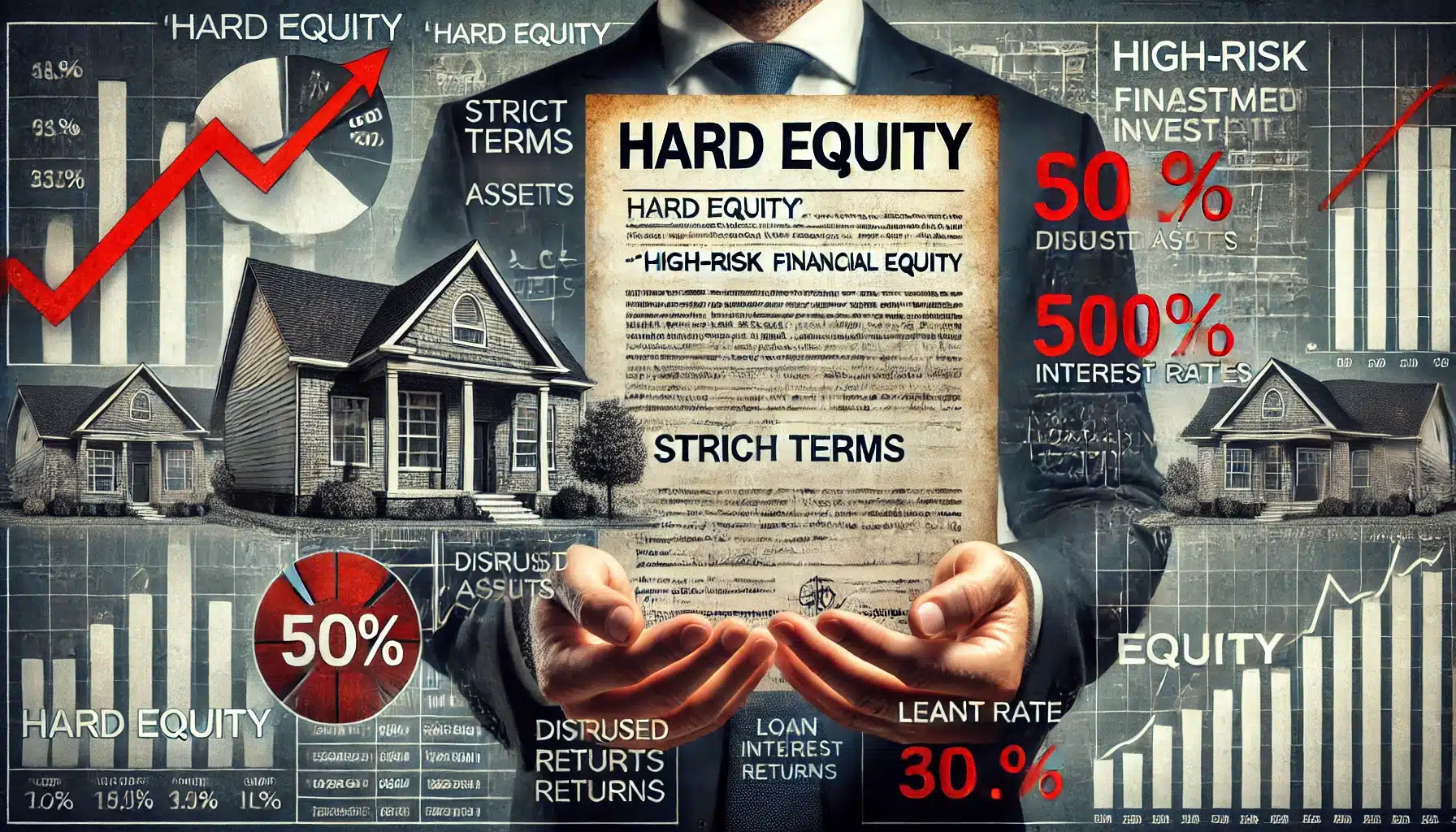Hard equity, explained

What is hard equity?
Hard equity refers to a type of financing often used in real estate, private equity, and other high-risk investment ventures. It involves equity capital that is provided with very strict terms, usually when traditional or softer forms of financing, like bank loans, are not available. Hard equity investors expect high returns due to the elevated risk associated with their investment. They are often involved in distressed assets, real estate flips, or situations where there is a fast turnaround but significant uncertainty.
Unlike softer forms of equity or traditional loans, hard equity financing is characterized by stringent conditions, such as higher interest rates, strict repayment schedules, or full ownership in the case of default. These investments are usually shorter-term, allowing the investors to make quick, high-reward decisions. Typically, in hard equity deals, the investor has significant control or ownership rights to ensure that they can recover their investment if the project fails.
Hard equity is commonly sought in situations where the borrower or entity cannot secure conventional loans, possibly due to poor credit, high leverage, or the speculative nature of the investment. Investors in this space are often private individuals or firms specializing in high-risk opportunities, leveraging their capital in return for larger equity stakes or aggressive repayment terms.
What is soft equity?
Soft equity refers to equity capital that is provided under more lenient and flexible terms compared to hard equity. It generally comes with lower expectations for returns and often offers more relaxed control and ownership conditions. This type of equity financing is common in startup funding, early-stage investments, or family-owned businesses, where investors are willing to take on some risk but without the strict repayment schedules or high control rights typically associated with hard equity.
Soft equity investors are often more patient, looking for long-term growth rather than quick returns. In many cases, these investors may be more supportive and hands-off, allowing business owners to retain significant control over their operations while still gaining access to needed capital. Soft equity is more aligned with cooperative and growth-focused investment models, where the emphasis is on supporting the company’s development rather than immediate financial gain.
It is typically used in situations where the business has solid growth potential but may not yet be profitable or where the focus is on scaling the business over a longer term. This type of equity is often seen in venture capital, angel investing, or funding from family and friends.
What is the difference between hard and soft equity?
The main difference between hard and soft equity lies in the terms, expectations, and flexibility of the investment. Hard equity is typically more rigid and comes with stringent conditions. It is often used in high-risk ventures, such as distressed assets or quick-turnaround real estate deals, where the investor demands a significant return due to the risk involved. Hard equity investors may impose strict repayment terms, higher interest rates, or take larger ownership stakes in the project to secure their investment. They tend to exert more control over the venture and may have the right to seize assets in the event of default.
On the other hand, soft equity is more flexible and lenient, usually seen in scenarios where investors are willing to take on risk with lower expectations for immediate returns. Soft equity investors are often more patient, focusing on long-term growth rather than quick profits. They allow business owners to retain more control and offer more supportive terms, often with fewer conditions tied to the equity investment. This type of equity is common in early-stage startups or businesses with growth potential that require time to scale.
In essence, hard equity involves stricter, more aggressive terms, while soft equity is characterized by a cooperative approach with more flexible, growth-focused expectations.
The terms “hard equity” and “soft equity” are not as widely recognized or standardized as some other financial terms like “equity” or “debt.” They likely entered the lexicon of finance through more informal usage within specialized investment sectors, such as private equity, real estate, or venture capital, where the distinctions between different types of equity financing became relevant.
“Hard equity” seems to have emerged in the context of high-risk, short-term investments, particularly in real estate and distressed asset acquisitions. These deals often required more rigid terms to protect investors from default risks, so the term likely evolved to describe equity that comes with strict conditions and high expectations for returns. It likely became more prominent as the private equity and real estate markets grew in the late 20th century, especially with the rise of aggressive leveraged buyouts (LBOs) and distressed asset investing.
“Soft equity,” by contrast, likely came into use around venture capital and startup funding, where patient capital with fewer conditions was needed to nurture early-stage companies. Its use may have become more common during the technology boom of the 1990s and early 2000s, when venture capitalists and angel investors sought to fund startups with flexible terms aimed at long-term growth rather than immediate returns.
Though these terms don’t have a clear or well-documented origin in the financial lexicon, their usage likely developed organically within specific sectors that required such distinctions between types of equity investment.
ChatGPT
Writer
ChatGPT is a large language model developed by OpenAI, based on the GPT-3.5 architecture. It was trained on a massive amount of text data, allowing it to generate human-like responses to a wide variety of prompts and questions. ChatGPT can understand and respond to natural language, making it a valuable tool for tasks such as language translation, content creation, and customer service. While ChatGPT is not a sentient being and does not possess consciousness, its sophisticated algorithms allow it to generate text that is often indistinguishable from that of a human.
